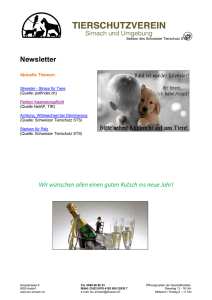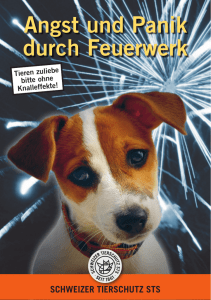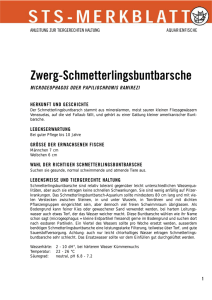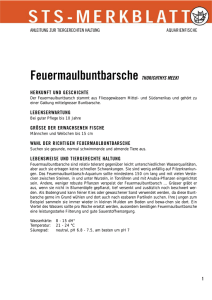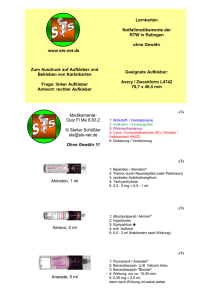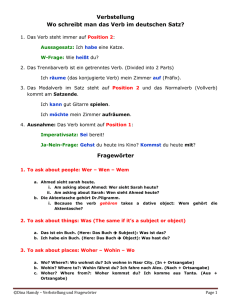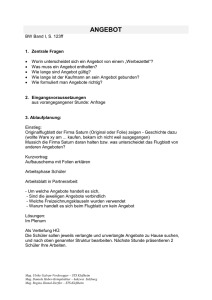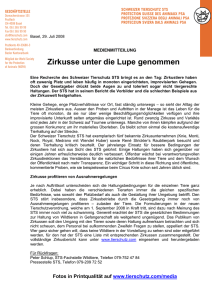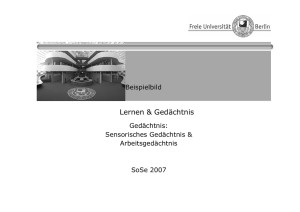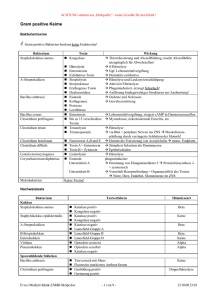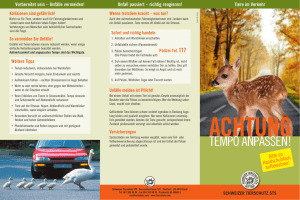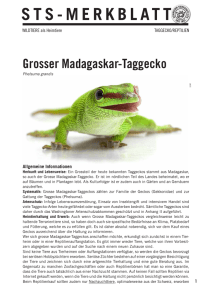K A P I T E L 1
Werbung
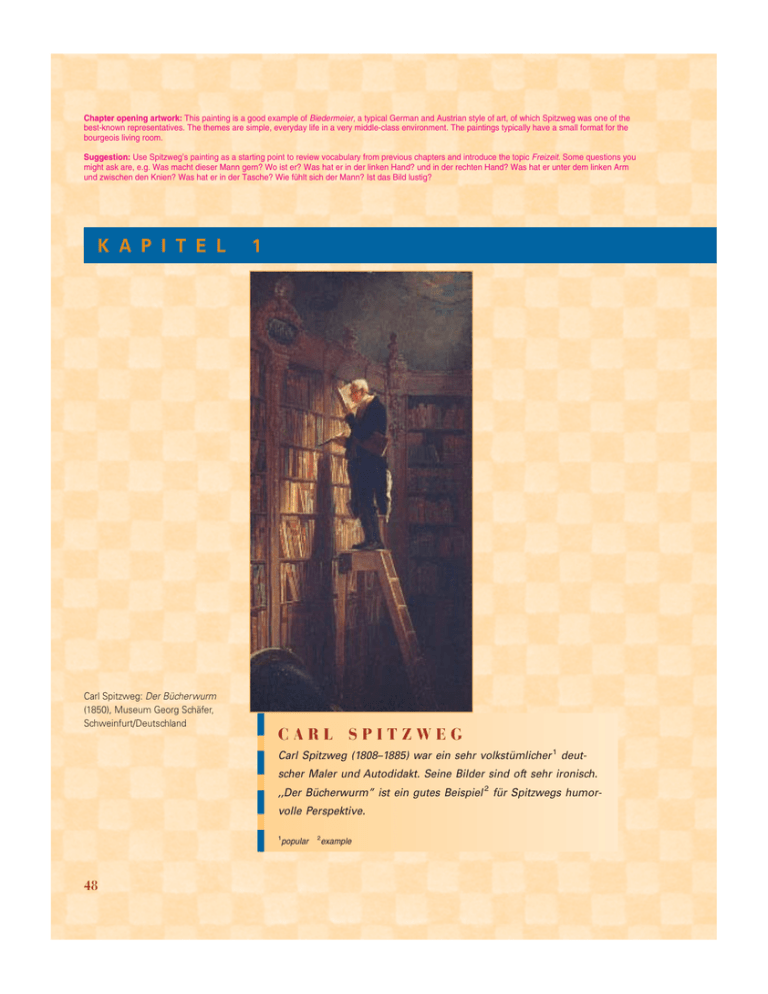
Chapter opening artwork: This painting is a good example of Biedermeier, a typical German and Austrian style of art, of which Spitzweg was one of the best-known representatives. The themes are simple, everyday life in a very middle-class environment. The paintings typically have a small format for the bourgeois living room. Suggestion: Use Spitzweg’s painting as a starting point to review vocabulary from previous chapters and introduce the topic Freizeit. Some questions you might ask are, e.g. Was macht dieser Mann gern? Wo ist er? Was hat er in der linken Hand? und in der rechten Hand? Was hat er unter dem linken Arm und zwischen den Knien? Was hat er in der Tasche? Wie fühlt sich der Mann? Ist das Bild lustig? K A P I T E L Carl Spitzweg: Der Bücherwurm (1850), Museum Georg Schäfer, Schweinfurt/Deutschland 1 CARL SPITZWEG Carl Spitzweg (1808–1885) war ein sehr volkstümlicher 1 deutscher Maler und Autodidakt. Seine Bilder sind oft sehr ironisch. ,,Der Bücherwurm” ist ein gutes Beispiel 2 für Spitzwegs humorvolle Perspektive. 1 popular 48 2 example Wer ich bin und was ich tue K A P I T E L Themen Freizeit Schule und Universität Tagesablauf Persönliche Daten 1 In Kapitel 1 you will learn to talk about how you spend your time: your studies, your recreational pursuits, and what you like and don’t like to do. Kulturelles Freizeit Schule und Universität Videoblick: Christkindl Videoecke: Tagesablauf Lektüren Brief eines Internatsschülers Guten Tag, ich heiße... Strukturen 1.1 1.2 1.3 1.4 1.5 1.6 The present tense Expressing likes and dislikes: gern / nicht gern Telling time Word order in statements Separable-prefix verbs Word order in questions GOALS This chapter extends sts.’ listening and speaking skills to exchange personal information. Sts. will continue to respond with single words, but short phrases will become increasingly common in their speech, and they will use more complete sentences in guided activities. They will learn to recognize and understand the various forms of the present tense, including verbs with separable prefixes. PRE-TEXT ACTIVITIES Provide input by using yourself as a model: Am Wochenende spiele ich oft Tennis. Ich spiele auch Karten mit meinem Freund Peter. Ich spiele gern Karten, aber Peter nicht. Er spielt gern Gitarre. Mime the meaning of words sts. don’t recognize. Make sure sts. understand the meaning of gern: Ich tanze gern. Tanzen Sie gern, Melanie? (Nein.) Melanie tanzt nicht gern. (Ja.) Monika tanzt gern. usw. Review the present-tense forms that were introduced in the preliminary chapters with sein, haben, heißen, and kommen. In Kapitel 1 the sts. need to understand and use many more present-tense forms. Note that regular present-tense forms are introduced in grammar Section 1.1, and verbs with separable prefixes and associated nouns in 1.5. It is unlikely, however, that you will be able to maintain this neat separation of categories within an activity when the focus is on meaning. Most sts. have no trouble with present-tense endings in German and quickly become accustomed to the variation of verb forms owing to person-number agreement. However, for those sts. with no prior foreign language experience, the concept of verb endings may take some time to grasp. In any case, sts. will not be able to use verb forms easily until they have had multiple opportunities to hear them used in communicative contexts. 49 S ituationen Vocabulary Display First state the infinitive of each activity, then read the sentences and have sts. repeat: wandern—Peter und Stefan wandern gern usw. After pronouncing each activity, do an association activity. (See the IM for suggestions on using association activities in Stage III.) Peter und Stefan wandern gern. Wer von Ihnen wandert gern? Heben Sie bitte die Hand. Associate one st. with each activity. Lisa wandert gern usw. After going through all the activities, see if sts. can remember the names matched with each hobby: Wer wandert gern? (Lisa.) Then ask students to produce the sentences by asking: Was macht Lisa gern? (Sie wandert gern.) usw. Freizeit ■ Grammatik 1.1–1.2 Peter und Stefan wandern gern. Ernst spielt gern Fußball. Melanie tanzt gern. Jutta und Gabi spielen gern Karten. Michael spielt gern Gitarre. Thomas segelt gern. 50 KAPITEL 1 Wer ich bin und was ich tue Veronika reitet gern. Herr und Frau Ruf gehen gern spazieren. Sit. 1. Preparation. Read through the situation. Ask sts. to repeat each line after you. Act out words unfamiliar to them, if they cannot guess (reisen, kochen, reiten). Next, sts. should individually read the exercise and write ja or nein next to every line as it applies to them. You then ask: Was machen Sie gern in den Ferien? Wer von Ihnen reist gern? Heben Sie bitte die Hand! usw. For items 3 and 4 ask: Wessen Eltern . . . ? and Wessen Bruder oder Schwester . . . ? (Most students will probably understand wessen immediately from context.) For 5 ask: Was mache ich gern? Was glauben Sie? AA. Sit. 1 can also be done as Partnerarbeit, where sts. ask each other what they or their families like to do. On an overhead or on the board, write appropriate questions for the responses in 1–5: (1) Was machst du gern in den Ferien? (2) Was machst du gern im Winter? (3) Was machen deine Eltern gern? (4) Hast du einen Bruder? (Ja/Nein.) eine Schwester? (Ja/Nein.) Was macht er /sie gern? (5) Was macht unser Deutschlehrer / unsere Deutschlehrerin gern? Model pronunciation and ask sts. to repeat. As they do so, answer the question for yourself. Then, have students work in pairs. 1 asks the questions, and 2 answers while 1 takes notes; then they switch. AA. Have sts. guess whether these statements are true for their instructor: In meiner Freizeit schwimme ich gern; gehe ich ins Kino; telefoniere ich gern; koche ich gern; arbeite ich für die Uni; spiele ich Fußball; boxe ich gern usw. S I T UAT I O N 1 Hobbys Sagen Sie ja oder nein. 1. In den Ferien... a. reise ich gern. b. koche ich gern. c. spiele ich gern Volleyball. d. arbeite ich gern. 2. Im Winter... a. gehe ich gern ins Museum. b. spiele ich gern Karten. c. gehe ich gern Schlitten fahren. d. schwimme ich gern. 3. Meine Eltern... a. spielen gern Tennis. b. spielen gern Golf. c. gehen gern ins Kino. d. singen gern. 4. Mein Bruder / Meine Schwester... a. wandert gern in den Bergen. b. zeltet gern. c. boxt gern. d. spielt gern Gitarre. 5. Mein Deutschlehrer / Meine Deutschlehrerin... a. geht gern auf Partys. b. reitet gern. S I T UAT I O N 2 c. geht gern ins Konzert. d. spielt gern Fußball. Informationsspiel: Freizeit Sit. 2. This is one in the series of information-gap activities. (See the MODELL S1: Wie alt ist Rolf? S1: Wie alt bist du? IM.) Model questions and answers are S2 : _____ S2: _____. 20. . given. The corresponding chart is in Appendix A. To start the activity, sts. S1: Woher kommt Richard? S1: Woher kommst du? pair off by counting 1, 2, 1, 2, etc. All S2 : Aus _____ S2: _____. Innsbruck. . twos turn to the appendix, and all ones work with the section in the chapter. S1: Was macht Richard gern? S1: Was machst du gern? Remind sts. not to show their half of S2 : Er _____ S2: _____. geht gern in die Berge. . the activity to their partners. After 1 has completed the table, 2 then asks questions to elicit the information needed to fill in the table in the appenAlter Wohnort Hobby dix. If sts. prefer, 1 can fill half the chart and then let 2 ask questions, then switch again to finish the task. Or Richard 18 Innsbruck geht gern in die Berge else they can simply alternate asking questions for each person listed: Rolf 20 Berkeley spielt gern Tennis S1: Wie alt ist Rolf? S2: 20. Wie alt ist Richard? Jürgen 21 Göttingen geht gern tanzen S1: 18. Was macht Richard gern? S2: Er geht gern in die Berge. Woher Sofie 22 Dresden kocht gern kommt Rolf? usw. One way to personalize this activity Jutta 16 München hört gern Musik and recycle the vocabulary a few days Melanie 21 Regensburg besucht gern Freunde later is to collect the same information presented in the chart from the sts. in mein Partner / the class. Ask each of them to hand in a slip of paper with their name, age, meine Partnerin where they are from, and what they like to do, and then make up your own 2-part chart. Use this personalized Informationsspiel as a warm-up activity. Sts. will enjoy speaking about themselves and will learn more about each other. Situationen 51 Sit. 3. This situation gives sts. the chance to use the 1st-person singular form of the verb. Model the interview questions yourself, and ask sts. to repeat after you. Quickly read through 1–10, again having the sts. repeat. Use your PF or mime to clarify and reinforce the meaning of the phrases. Sts. then conduct the interview in pairs, taking notes about each other’s likes and dislikes. Afterward, ask sts. to tell you what their partner enjoys doing: Steve, was macht Ann gern? Ann spielt gern Schach und geht gern spazieren. If sts. quickly become adept at using the first-person form of the verb and they want to be able to talk about each other, you could also have them do the situation in groups of three: S1: Ich spiele gern Karten. Du auch? S2: Ja /Nein, ich spiele auch /nicht gern Karten. S1: (to S3, who could act as the notetaker) Ann spielt gern Karten. S I T UAT I O N MODELL S1: S2: 1. 2. 3. 4. 5. 6. 7. 8. 9. 10. Ich Ich Ich Ich Ich Ich Ich Ich Ich Ich 3 Interview: Was machst du gern? Ich spiele gern Karten. Du auch? Ja, ich spiele auch gern Karten. Nein, ich spiele nicht gern Karten. spiele gern Schach. wandere gern. gehe gern spazieren. reite gern. singe gern. spiele gern Volleyball. höre gern Musik. koche gern. tanze gern. lerne gern Deutsch. Kultur . . . Landeskunde . . . Informationen Freizeit ■ ■ ■ ■ ■ ■ Was machen Menschen in Ihrem Land in ihrer Freizeit? Was machen Sie in Ihrer Freizeit? am Wochenende? abends? in den Ferien? Was machen Ihre Eltern in ihrer Freizeit? am Wochenende? abends? in den Ferien? Wie viele Stunden Freizeit haben Sie am Tag? Was machen Deutsche in ihrer Freizeit? Was ist anders als in Ihrem Land? Was ist ähnlich? Wie viele Stunden Freizeit haben Deutsche am Tag? Raten1 Sie! fernsehen Musik hören Zeitung lesen Bücher lesen Ausflüge machen reisen 1 Guess KLI. (1) Establishing the topic: Use your PF and show a few leisure time activities, asking sts. what they are. While sts. have their books closed, ask them the prereading questions at the top of the KLI to sample a few responses. (2) Prereading: Ask sts. to work in groups of 3–4 and to answer these questions for their group. Ask them to report back to the whole class. (3) Cultural analysis: Ask sts. again 52 KAPITEL 1 Wer ich bin und was ich tue to work in groups and to report back to the class. Information. Germans have on average 4 hours of leisure time per day, 2 of which they spend watching TV. Sit. 4. This is an autograph activity. (See the IM for suggestions on the use of autograph activities.) Sts. move around the classroom and try to find someone who can answer ja to a question in the activity. 1 asks 2 a question, and if 2 answers ja, he/she signs the line next to that activity. Once 2 answers ja, 1 moves on and asks a different person the next question. If 2 answers nein, 1 can then ask another question. Sts. try to get as many signatures as possible within a certain time limit, perhaps 5 minutes. The person who gets the most signatures wins. Follow-up. Ask sts. about their responses. Wer spielt gern Gitarre? Wer schwimmt gern? Then address the person identified and ask for confirmation. Schwimmen Sie gern, Katy? S I T UAT I O N 4 Umfrage MODELL S1: Schwimmst du gern im Meer? Ja. S1: Unterschreib bitte hier. S2: UNTERSCHRIFT 1. 2. 3. 4. 5. 6. 7. 8. 9. 10. Schwimmst du gern im Schwimmbad? Trinkst du gern Kaffee? Spielst du gern Gitarre? Hörst du gern Musik? Gehst du gern zelten? Arbeitest du gern? Gehst du gern joggen? Tanzt du gern? Spielst du gern Golf? Machst du gern Fotos? ______________________________ ______________________________ ______________________________ ______________________________ ______________________________ ______________________________ ______________________________ ______________________________ ______________________________ ______________________________ Schule und Universität Vocabulary Display Pronounce the subjects with the appropriate definite article and have sts. repeat. Sts. will have little difficulty understanding the subjects, but pronunciation may be a problem. Have sts. repeat in chorus. Then associate each subject with a st. Wer studiert Kunst? If no one studies a particular subject, make up a person’s name and write it on the board (without a subject) and say Michael studiert Kunst. Go through all the subjects. Then go through the names asking: Was studiert Michael? (Er studiert Kunst.) You may wish to point out that all the subjects in this display are feminine, except for der Sport and der Maschinenbau. ■ Grammatik 1.3 Situationen 53 Sit. 5. (See the IM.) Set the scene and introduce the characters. Work either with sts.’ books open or closed. With books closed, ask the following focus questions: 1. Woher kommt Rolf? 2. Was macht er in den USA? 3. Was studiert Stefan? At the end, have sts. work in pairs to produce a similar dialogue. Cultural note. In Germany, Austria, and Switzerland, sts. decide on their field of specialization before entering the university. There is no period of general study as in the U.S. Sts. then take their MA (Diplom, Magister, or Staatsexamen) exam after at least 4 years of study. Those who decide to write a doctoral dissertation start their research right after their exams. Doctoral candidates do not take courses. Future teachers must take the Staatsexamen in 2 fields, along with pedagogy. Sit. 6. Present ways to tell time using the overhead projector or a toy clock before doing the activity in class. Enliven your presentation and recycle verbs with commentary: Es ist acht Uhr. Um acht Uhr gehe ich zur Uni. usw. S I T UAT I O N 5 Dialog: Was studierst du? Stefan trifft Rolf in der Cafeteria der Universität Berkeley. STEFAN: Hallo, bist du neu ___ hier? Ja, ich kom me aus Deutschland. _____ STEFAN: Und was machst du __ hier? ROLF: Ich stud iere Psychologie. Und du? ______ STEFAN: ___ Che mie. ___ ROLF: S I T UAT I O N S1: S2: 6 Wie spät ist es? Wie spät ist es? Es ist _____. Cultural note (Sit. 7). This chart represents a typical Gymnasium schedule for 7th to 10th grade, including breaks and regular school hours. Most sts. go home at 1 o’clock. In the upper grades, there is no afternoon instruction apart from physical education. Two foreign languages are mandatory, besides German and math (Hauptfächer, usually 4 lessons per week). Nebenfächer such as history, biology, and physics are taught twice a week. Every student in a given grade takes the same courses. 1. 2. 3. 4. 5. 6. 7. 8. 9. 10. AA. Point out the time difference between Germany and your time zone and ask sts. to calculate the current time in Germany. Sit. 7. (See the IM.) Introduce days of the week and, if necessary, review the pronunciation of the academic subjects, before doing the activity. Model the question before having sts. work in pairs. The corresponding chart is in Appendix A. S I T UAT I O N MODELL S1: S2: 7 Informationsspiel: Juttas Stundenplan Was hat Jutta am Montag um acht Uhr? Sie hat Latein. Uhr Montag Dienstag Mittwoch Donnerstag Freitag 8.00–8.45 Latein Mathematik Deutsch Biologie Französisch 8.50–9.35 Deutsch Englisch Englisch Latein Physik 9.35–9.50 m8888888888888888888888888888888 Pause 888888888888888888888888888888888888n 9.50–10.35 Biologie Sozialkunde Mathematik Geschichte Religion 10.40–11.25 Geschichte Französisch Physik Mathematik Deutsch 11.25–11.35 m8888888888888888888888888888888 Pause 888888888888888888888888888888888888n 11.35–12.20 Sport Musik Erdkunde Sport Latein 12.25–13.10 Erdkunde Deutsch Kunst Sozialkunde frei 54 KAPITEL 1 Wer ich bin und was ich tue Sit. 8. Model pronunciation and have sts. repeat. Have sts. guess the meaning of new expressions in context (erster Kurs, nach Hause, ins Bett). Ask sts. to think briefly about their answers and jot them down. Or else sts. could quickly draw their schedule in a manner similar to Jutta’s. They then find partners, and 1 asks the questions while 2 answers. 1 records 2’s responses. Afterward, ask sts. to mention 3 things they learned from their partners. S I T UAT I O N 8 Interview 1. Welche Fächer hast du in diesem Semester? Welche Fächer magst du? Wel- che Fächer magst du nicht? 2. Wann beginnt am Montag dein erster (1.) Kurs? Welcher Kurs ist das? Wann gehst du am Montag nach Hause? 3. Wann beginnt am Dienstag dein erster Kurs? Welcher Kurs ist das? Wann gehst du am Dienstag nach Hause? 4. Arbeitest du? An welchen Tagen arbeitest du? Wann beginnt deine Arbeit? 5. Wann gehst du in der Woche ins Bett? Und am Wochenende? KLI. (See also the IE notes for Sit. 7.) Ask sts., in small groups, to complete the first 7 questions about their own schools. Write the results in 1 column on the board. Then ask sts. to analyze the chart in Sit. 7 (second set of questions) and write the results in a second column on the board. Information. One of the striking differences between German and U.S. primary and secondary schools is that in Germany there is no afternoon school (except perhaps for 1– 2 hours of physical education per week). Sts. are expected to spend a few hours per day completing their homework at home. Another difference is that in Germany school time is reserved mainly for academic subjects. In addition, the study of foreign languages plays a major role. Starting with grade 5, all students study a foreign language, usually English, for at least 5 years. At the Gymnasium, sts. must take at least 7 years of one foreign language Kultur . . . Landeskunde . . . Informationen Schule und Universität ■ ■ ■ ■ ■ ■ ■ Wann beginnt in Ihrem Land morgens die Schule? Wann gehen die Schüler nach Hause? Wann und wo machen sie Hausaufgaben? Wann haben sie Freizeit? Welche Schulfächer haben Schüler? Welches sind Pflichtfächer1? An welchen Tagen gehen die Schüler in die Schule? Schauen Sie auf Juttas Stundenplan (Situation 7). ■ ■ ■ ■ ■ Wann beginnt für Jutta die Schule? Wann geht sie nach Hause? Welche Fächer hat Jutta? Wie viele Fremdsprachen hat sie? An welchen Tagen geht sie in die Schule? Was meinen Sie? ■ ■ Wann und wo macht Jutta Hausaufgaben? Wann hat sie Freizeit? Cultural note. Point out that while the word “student” is used for both school and university students in English, in German a distinction is made between Schüler /in (Grundschule [elementary school] through Gymnasium) and Student /in (university only). Photo questions. Wer sind diese Leute? Was machen sie? Wie alt sind sie? Was fragen sie? Welche Jahreszeit ist es? 1 required subjects Große Pause an einem Gymnasium in Berlin and 5 years of a second foreign language; certain kinds of Gymnasien (e.g., Humanistisches Gymnasium, Neusprachliches Gymnasium) require the study of a third foreign language. While Jutta doesn’t go to school on Saturdays, some sts. still do. Then, they usually get off 1 or sometimes 2 Saturdays per month. See also the IM for additional instructor’s notes. Situationen 55 Vocabulary Display (See the IM for suggestions on using vocabulary displays.) Presentation. Receptive recall (random order): Um wie viel Uhr geht Herr Wagner ins Bett? Um wie viel Uhr steht er auf? usw. Choral response. Productive recall (random order): Was macht Herr Wagner um sieben Uhr abends? Was macht er morgens um Viertel nach sieben? usw. Personalization: Wann stehen Sie auf? usw. Also, have your sts. formulate interview questions (with your help) modeled after the display: Wann stehst du auf? Wann duschst du? usw. and ask them to interview 2 other sts., copying down the answers in a notebook. Tagesablauf ■ Grammatik 1.4–1.5 Herr Wagner steht auf. Sit. 9. This is the first “narration series,” a set of sketches that form a connected narrative. These series are included to give sts. a chance to hear and use verb forms and tenses and to practice narration in past, present, and future. Use the same approach as with the vocabulary displays, followed by an oral or written practice of narration. In this situation sts. practice separable-prefix verbs in a meaningful context. Note: Narration series are also on tape in the laboratory program. Presentation (transparency on overhead): Das ist Sofie. Was macht Sofie an einem normalen Tag? Bild 1. Sofie steht um sieben Uhr auf. 2. Sie duscht. 3. Sie frühstückt. 4. Sie packt ihre Bücher ein. 5. Sie geht zur Uni. 6. Sie füllt ein Formular aus. 7. Sie geht zur Post. 8. Sie holt ein Paket ab. 9. Sie geht nach Hause. 10. Sie ruft ihre Freundin an. 11. Sie gehen zusammen aus. Receptive recall (random order): Welches Bild zeigt „Sofie geht zur Uni?“ (Bild 5.) usw. Choral response. Productive recall (normal sequence): Was macht Sofie in Bild 1? usw. Personalization: Schreiben Sie auf, was auch Sie an einem ganz normalen Tag machen. Focus on narration: Ask sts. to write down the sentences from memory (with the help of the drawings). Put sts. in groups of 3 to proofread their writing. Follow up by writing the story on the board, according to your students’ dictation. 56 Er geht einkaufen. Er duscht. Er räumt die Wohnung auf. S I T UAT I O N 1. 9. 2. KAPITEL 1 Wer ich bin und was ich tue 10. Er geht zur Arbeit. Er geht im Park spazieren. Er geht ins Bett. Bildgeschichte: Ein Tag in Sofies Leben 9 5. Er frühstückt. 3. 6. 4. 7. 8. 11. Sit. 10. As with all activities in Kontakte, make sure sts. understand new words before they work in groups. Model the questions in Part 1 (samstags). Then ask sts. to work in pairs. Sts. answer ja/nein. As 1 asks the questions, 2’s book should be closed. In this (as in most group) activities, have a few sts. report back to the class at the end. If sts. know they might be asked about their partners’ answers, they will listen more carefully. Encourage sts. to answer truthfully and to expand on their answers. Circulate while they work on the interview, and provide new vocabulary when needed. S I T UAT I O N 10 Interview 1. Was machst du samstags? a. Spielst du Fußball? b. Stehst du spät auf? c. Gehst du im Park spazieren? d. Rufst du deine Eltern an? e. Gehst du einkaufen? f. Besuchst du Freunde? 2. Was machst du montags? a. b. c. d. Stehst du früh auf? Frühstückst du zu Hause? Trinkst du Kaffee? Kaufst du ein? e. Arbeitest du in der f. Bibliothek? Hast du Zeit für Sport? Was machst du? 3. Was machst du freitags? a. Gehst du tanzen? b. Bleibst du zu Hause? c. Hörst du Musik? Sit. 11. (See the IM.) The corresponding chart is in Appendix A. S I T UAT I O N 11 d. Rufst du Freunde an? e. Räumst du dein Zimmer auf? f. Spielst du Tennis? Informationsspiel: Diese Woche MODELL S1: Was macht Silvia am Montag? Sie steht um 6 Uhr auf. S1: Was machst du am Montag? S2: Ich _____ . S2: Montag Silvia Mertens Mehmet Sengün Sie steht um 6 Uhr auf. Er geht um 7 Uhr zur Arbeit. Dienstag Sie arbeitet am Abend in einer Kneipe. Mittwoch Sie schreibt eine Prüfung. Donnerstag Sie ruft ihre Eltern an. Freitag Sie geht tanzen. Er hört um 15 Uhr mit der Arbeit auf. Samstag Sie geht mit Freunden ins Kino. Er räumt seine Wohnung auf. Sonntag Sie besucht ihre Eltern. Er repariert sein Motorrad. mein(e) Partner(in) Er lernt eine neue Kollegin kennen. Er singt im Männerchor. Er geht einkaufen. Situationen 57 Sit. 12. (See the IM.) Sts. ask questions using the 2nd-person singular verb form while also increasing their skill at using time expressions. Before having sts. work in pairs on their own, model pronunciation and have sts. repeat. Answer the questions yourself. Then have sts. close their books, and elicit the questions by acting out the activities: mime getting up in the morning, eating breakfast, etc. If sts. enjoy performing for one another, have the first st. who asks the question correctly perform another example. S I T UAT I O N 1. 2. 3. 4. 5. 6. 7. Wann Wann Wann Wann Wann Wann Wann 12 Interview stehst du auf? duschst du? frühstückst du? gehst du zur Uni? kommst du nach Hause? machst du das Abendessen? gehst du ins Bett? L ektüre Lektüre. The reading in each Lektüre section is introduced by a variety of reading strategies and exercises. (See the IM for more on reading.) The most important strategies are explained in detail when they are first introduced. In later chapters, the skills are just practiced. Besides global strategies such as anticipating content, sts. are introduced to specific foreignlanguage reading skills such as contextual guessing or recognizing cognates and compounds. This reading is a letter that a boarding school student writes to a friend about his daily routine at the school. (1) Establish the context by asking 2 or 3 sts. about their daily routines during the school week. Use questions like: Wann stehen Sie während der Woche auf? Wann frühstücken Sie? Wann beginnt der Unterricht an der Uni? Wann machen Sie Mittagspause? etc. (2) Focus sts.’ attention on the Lesehilfe box next to the reading so that they have a feel for the text type. Then let sts. read Vor dem Lesen Part A and work on questions 1 through 7 with a partner while jotting down their answers. Wrap up by briefly discussing their answers. (3) Ask sts. to read through the text before they work on Vor dem Lesen Part B individually. Do a wrap-up on the board by sorting the words that they find into two lists: 1) words that are actually English, and 2) words that are cognates. (4) Explain Arbeit mit dem Text Part A and demonstrate the task in class. Ask sts. to read the sentence in line 7 and then guess what von... bis means in this context. Proceed similarly with Morgentoilette. Let sts. read lines 4 and 5. Then you might want to help the guessing along by miming that you comb your hair, wash your face, and so forth. Assign the rest of the task and Part B of Arbeit mit dem Text as homework. Emphasize that sts. need to read the text at least one more time before they start on Part B. (5) Part C 58 Vor dem Lesen A. Think back to when you were in the ninth grade and answer the following questions. Welchen Tagesablauf haben Schüler in Ihrem Land in der 9. Klasse? 1. 2. 3. 4. 5. 6. 7. Wann Wann Wann Wann Wann Wann Wann stehen die Schüler und Schülerinnen während der Woche auf? frühstücken sie? beginnt der Unterricht? ist Mittagspause? ist der Unterricht zu Ende? essen die Schüler und Schülerinnen zu Abend? gehen sie ins Bett? B. In the following text, underline the words that are English or that seem to be closely related to English. If you are unsure about a word that looks similar to an English word, look it up in the glossary in the appendices of this book. Then write it in the margin of the text next to the German word. Arbeit mit dem Text A. You can guess the meaning of many words from context. Guessing from context is a very useful skill, especially when reading. Try to guess the meaning of the following words by looking at the sentences in which they appear. Some hints are provided. 1. Morgentoilette (line 5) HINT: the first things you do after getting up to get ready for the day 2. von... bis (line 7) HINT: used to express time periods 3. meistens (line 8) HINT: used to express frequencies; related to English “most” 4. Brötchen (line 10) HINT: something to eat for breakfast on which you may put jam of Arbeit mit dem Text lends itself to groupwork in class after Part B has been completed. Explain the task, then ask sts. to work in groups of 2 or 3 and determine on what information from the text they base their inferences. Do a quick wrap-up in class before you assign Nach dem Lesen as homework. KAPITEL 1 Wer ich bin und was ich tue Brief eines Internatsschülers LESEHILFE Before reading this text, look at its structure. Judging from the salutation at the beginning—Liebe Ana—and the greeting at the end—Bis bald und alles Liebe Dein Felix—you might guess that it is a letter. It is written by Felix to his friend Ana. Felix is a ninth-grade student at an Internat (boarding school). Apparently Ana has asked Felix what his day looks like, and he is telling her that in his letter. 5 10 15 20 25 30 5. Mittagessen (line 14) HINT: what do you eat after six hours of school 6. üben (line 16) HINT: what you do with a piano to improve proficiency 7. ungestört (line 21) HINT: The reason for the slience is so that students may work _____; notice the prefix un-. 8. Kopfhörer (line 23) HINT: gadget that fits on your head for listening to music 9. ausmachen (line 29) HINT: what you do to the lights when you go to bed 1 probably Whoever 10 2 different 3das Gebet prayer 4finished 5because board games 12das... turn off the light 6 piano 7 pass 8 are allowed 9 so that 11 Situationen 59 B. What is Felix’s day like? What does he do, and when? Read the text and match the activity to the time. Was macht Felix wann? h _____ a _____ i _____ c _____ j _____ 6.55 Uhr 7.20 Uhr 7.20–7.40 Uhr 7.55 Uhr 13.10–13.40 Uhr a. b. c. d. e. f 6. _____ 13.40–15.30 Uhr b 7. _____ 15.30 Uhr f. g. e 8. _____ 16.00–18.00 Uhr g 9. _____ 18.00–21.00 Uhr d 10. _____ 21.30 Uhr h. i. j. 1. 2. 3. 4. 5. Er macht sein Morgengebet. Es gibt Tee und Kuchen. Der Unterricht beginnt. Er macht das Licht aus. Silentium: er macht Hausaufgaben. Er hat Freizeit. Es gibt Abendessen und dann ist Abendfreizeit. Er steht auf. Er frühstückt. Er isst zu Mittag. C. Zwischen den Zeilen lesen.1 When reading and listening, we usually understand more than what is being said. We come to conclusions based on particular information or indications. When we do this we are drawing inferences. What are possible answers to the following questions? On what information from the text do you base your inferences? Was glauben Sie? Was steht im Text dazu? 1. Auf welche Art2 von Internat geht Felix? 2. Wann schreibt er den Brief? 3. Wer ist Ana? Nach dem Lesen Schreiben Sie einem Klassenkameraden einen Brief auf Deutsch über Ihren Tagesablauf. Schreiben Sie ca. 100 Wörter. Vergessen Sie nicht die Anrede3 und den Abschiedsgruß. Liebe Ana / Lieber Felix ... Viele Grüße / Herzliche Grüße / Alles Liebe Deine Ana / Dein Felix 1 Zwischen... Reading between the lines 60 KAPITEL 1 Wer ich bin und was ich tue 2 welche... what kind 3 salutation Persönliche Daten Vocabulary Display The goal of this section is to introduce question forms. Ask sts. to scan the ID application form. Reassure them that they need not understand every word. They should try to figure out the meanings of the technical words from context. Ask questions such as: Wie heißt die Frau? Wo wohnt sie? Welche Farbe haben ihre Augen? Wie groß ist sie? Wie alt ist sie? Wann ist sie geboren? Wo ist sie geboren? Write questions on the board, and have sts. repeat them. Now personalize by asking similar questions: Wo wohnen Sie? und Ihre Familie? Wo sind Sie geboren? usw. Use an association activity to review sts.’ answers: Wo wohnt Claudia? Wie alt ist sie? usw. If sts. seem ready to produce a few questions themselves, have them ask you your name, age, etc. Sit. 13. (See the IM.) This dialogue provides a model for the role-play that follows it. We suggest moving from comprehension to production via a series of steps. The following steps are intended for use with the textbooks closed. (1) Set the scene: Melanie braucht einen neuen Personalausweis (show picture of a Personalausweis). Sie wohnt in Regensburg. Also geht sie auf das Rathaus in Regensburg (show picture of a Rathaus). Sie spricht mit einem Beamten. (2) Ask focus questions: Wie heißt Melanie mit Nachnamen? Was ist ihre Adresse? Was ist ihre Telefonnummer? Was ist sie von Beruf? Ist sie verheiratet? (3) Play the dialogue. (4) Review sts.’ answers. (5) Ask sts. to count the words in each sentence. (6) Divide sts. in two groups, assign one role to each group, and ask each group to repeat their lines. (7) Ask groups to repeat their lines from memory. To help sts. remember, write the first word or words of each question on the board. (8) Ask 2–3 pairs of volunteers (1 from each group) to present the dialogue in front of the class. Instead of assuming their previous roles, however, they should change the lines of the dialogue to talk about themselves. (9) Sts. get up and work in pairs. While moving from one person to the next, they act out their personalized versions several times. ■ Grammatik 1.6 S I T UAT I O N 13 Dialog: Auf dem Rathaus Melanie Staiger ist auf dem Rathaus in Regensburg. Sie braucht einen neuen Personalausweis. BEAMTER: Grüß Gott! Grüß Gott. Ich brauche einen neuen Pers onal____ ausw__ eis. ______ BEAMTER: Wie ___ ist Ihr Name, bitte? MELANIE: Staiger, Melanie Staiger. Cultural note. In German-speaking counBEAMTER: Und __ wo wohnen Sie? tries, you are required to register with the local town administration when you take MELANIE: In Regensburg. residence somewhere (einen Wohnsitz anBEAMTER: Was ___ ist die genaue Adresse? melden). You must also inform them whenever you move (ummelden/abmelden) MELANIE: Gesandtenstraße 8. so that the government always has your BEAMTER: Haben Sie auch Tele fon? _____ current address. The Einwohnermeldeamt, or an administrative subdivision, also isMELANIE: Ja, die Nummer ist 24352. sues passports and ID cards. BEAMTER: Wa nn sind Sie geboren? ____ MELANIE: Am 3. Ap ___ril 1984. BEAMTER: Was sind Sie __ von___ Be__ ruf? MELANIE: Ich bin Studentin. BEAMTER: Sind Sie verheiratet? MELANIE: Nein ___. Ich bin ledig. MELANIE: Situationen 61 Videoblick Christkindl Der Christkindlmarkt1 in Nürnberg wird jedes Jahr zur Weihnachtszeit2 vom Christkindl eröffnet. In diesem Clip lernen Sie das Christkindl kennen. ■ ■ am stkindl er Chri rg e nd b u rn s Nü chuhe ucht da arme S ra w b l, s h a o W Jaw dsten? dringen . n e er v gute N 1 Christmas market 2 ■ Videoecke. The video segment focuses on holiday traditions, particularly on the Southern German and Austrian tradition of the Christ child and on various regional Easter traditions. The clip on the Christ child features views of the Christkindlmarkt in Nürnberg, one of the most famous Christmas markets in the world. Christmas time Sit. 14. (See cultural note under Sit. 13.) Have sts. work in pairs. 2’s book should be closed, and 1 should write down the information as 2 answers. Sts. might also need to ask: Wie schreibt man Ihren Namen? Wie, bitte? usw. Sit. 15. Rollenspiel. This is one of many role-plays in Kontakte. (See the IM.) The role for student 1 (S1) appears here, the role for student 2 (S2) appears in Appendix B. (1) Set the scene as described in the role for S1. (2) Provide sts. with a model by working with the enactment of the role-play found in the workbook/lab manual. (3) Write the structure of the role-play on the board: begrüßen; fragen und antworten; bedanken und verabschieden. (4) Elicit possible greetings, questions, and how to say good-bye from sts. and write on board. Ask for appropriate responses to the greeting and leave-taking and for possible answers to the questions, and write them on the board as well. (5) Divide the class in 2 groups and 62 ■ Wer spielt die Rolle des Nürnberger Christkindls? Wie alt ist diese Person? Was für Fragen stellen ihr die Kinder? Was sind ihre Hobbys? S I T UAT I O N 1. 2. 3. 4. 5. 6. 7. 8. 9. 10. 14 Interview: Auf dem Rathaus Wie heißen Sie? Wie alt sind Sie? Wo sind Sie geboren? Wo wohnen Sie? Was ist Ihre genaue Adresse? Was ist Ihre Telefonnummer? Was studieren Sie? Sind Sie verheiratet? Welche Augenfarbe haben Sie? Welche Haarfarbe? S I T UAT I O N 15 Rollenspiel: Auf dem Auslandsamt s1: Sie sind Student/Studentin und möchten ein Jahr lang in Österreich studieren. Gehen Sie aufs Auslandsamt und sagen Sie, dass Sie ein Stipendium möchten. Beantworten Sie die Fragen des Beamten / der Beamtin. Sagen Sie am Ende des Gesprächs „Auf Wiedersehen“. assign 1 part of the role-play to each group. Ask sts. to practice the role-play in pairs. (6) Ask 2–3 pairs of sts. to perform their role-play in class. Provide feedback as to appropriateness and accuracy of language used, after sts. have returned to their seats. The intention here is not to correct all or even most mistakes KAPITEL 1 Wer ich bin und was ich tue but rather to focus on a few phrases and sentences that are the most useful for all or most sts. in the context of this role-play. (7) Ask sts. to find new partners and to practice the role-play in pairs again. (8) Optional homework assignment: Ask sts. to write up their version of the role-play. Sit. 16. Preview Nützliche Wörter and the information missing in the poster. Ask sts. to guess what the missing information might be. Write guesses on the board. Ask sts. to work in pairs. Read or play the complete text at least twice. Ask sts. to correct their guesses on the board. Read or play one last time asking sts. to knock on the table when they hear the following words: Spitzname, Vollbart, Sonnenbrille, Narbe, Halstuch. Text for listening comprehension: Gesucht wird der Bankräuber Paul Steckel, bekannt unter dem Spitznamen Narben-Paule. Er ist 35 Jahre alt, sieht aber älter aus. Seine Haare sind mittelblond, zuletzt hatte er einen Vollbart. Seine Augen sind graublau. Er trägt oft eine Sonnenbrille. Besonderes Kennzeichen ist eine circa drei Zentimeter lange Narbe unter dem rechten Auge. Steckel ist einen Meter fünfundachtzig groß, schlank und spricht mit Berliner Akzent. Meistens trägt er eine schwarze Jeansjacke und Cowboystiefel, dazu ein Halstuch. . Vorsicht, er ist bewaffnet! S I T UAT I O N 16 Gesucht1! Schreiben Sie die fehlenden Angaben2 in den Steckbrief. NÜTZLICHE WÖRTER der Bankräuber ⫽ bank robber der Spitzname ⫽ nickname besonderes Kennzeichen ⫽ distinguishing feature die Narbe ⫽ scar das Halstuch ⫽ bandanna bewaffnet ⫽ armed GESUCHT Paul Steckel Spitzname: ___________________-Paule Alter: ___________________ Jahre, sieht älter aus Haarfarbe: mittel___________________, Voll___________________ ___________________: graublau Besonderes Kennzeichen: ___________________ unter dem rechten ___________________ Größe: ___________________ cm, schlank Akzent: ___________________ Kleidung: meistens ___________________ Jeansjacke und ___________________, dazu ein ___________________ 1 Wanted 2 information Situationen 63 L ektüre Vor dem Lesen Welche Informationen geben Sie, wenn Sie sich vorstellen1? Kreuzen Sie an. LESEHILFE In this reading, several of the characters of Kontakte are introduced. Before reading, look at each of the pictures and say as much as you can about the characters, based on the drawings. Now read the text once through. How closely do the pictures reflect what is in the text? Name Alter Beruf/Studienfach Familie Freunde Geburtsdatum Gewicht2 Hobbys Herkunft Schulnoten3 Interessen Adresse Minwörterbuch Lektüre. This reading consists of three short first-person introductions of three of the characters in Kontakte. (1) Establish the context, e.g., by asking 2–3 students to say as much about themselves as they can. (2) Explain the prereading task, allow your students about one minute to complete the task, and discuss their answers briefly. Ask: Welche Informationen geben Sie, wenn Sie sich vorstellen? Sagen Sie ja oder nein, and read all options one by one. (3) Explain the reading task Arbeit mit dem Text 씮 das Fahrrad die Gärtnerei der Geschäftsmann der Lastwagen der Ort seit die Sozialkunde die Speditionsfirma unterrichten unterwegs bicycle nursery (gardening) businessman truck town for social studies trucking company to teach on the road Guten Tag, ich heiße... G uten Tag, ich heiße Veronika Frisch. Ich bin verheiratet und habe drei Töchter. Sie heißen Natalie, Rosemarie und Lydia. Ich lebe mit meinem Mann Bernd und unseren Töchtern in der Schweiz. Wir wohnen in Zürich. Ich komme aus Zürich und mein Mann kommt aus Luzern. Ich bin dreiundreißig 5 Jahre alt und Bernd ist fünfzig. Bernd ist Geschäftsmann hier in Zürich und ich bin Lehrerin. Ich unterrichte Französisch und Sozialkunde. Meine Freizeit verbringe ich am liebsten mit meiner Familie. Außerdem reise ich gern. G uten Tag, ich heiße Sofie Pracht, bin 22 und komme aus Dresden. Ich studiere Biologie an der Technischen Universität Dresden. Ein paar Stun- 10 den in der Woche arbeite ich in einer großen Gärtnerei. In meiner Freizeit gehe ich oft ins Kino oder ich besuche Freunde. Ich spiele Gitarre und tanze sehr gern. Mein Freund heißt Willi Schuster. Er studiert auch hier in Dresden an der Technischen Universität. Er kommt aus Radebeul. Das ist ein kleiner Ort ganz in der Nähe von Dresden. Am Wochenende fahren wir manchmal mit 15 dem Fahrrad nach Radebeul und besuchen seine Familie. 1 sich... introduce yourself 64 KAPITEL 1 Wer ich bin und was ich tue 2 weight 3 grades G uten Tag, ich heiße Mehmet Sengün. Ich bin 29 und in Izmir, in der Türkei, geboren. Ich lebe jetzt seit 19 Jahren hier in Berlin. Ich wohne in Kreuzberg, einem Stadtteil von Berlin, in einer kleinen Wohnung. In Kreuzberg leben sehr viele Türken — die Berliner nennen es Klein-Istanbul — und 20 viele meiner türkischen Freunde wohnen ganz in der Nähe. Im Moment arbeite ich für eine Speditionsfirma hier in der Stadt. Ich fahre einen Lastwagen und bin viel unterwegs. Ich weiß nicht, aber richtig zu Hause fühle ich mich in Berlin auch nicht und für die Deutschen bin ich immer der Türke. and ask your sts. to work in groups of 2–3 and fill in the table for Veronika Frisch. Briefly discuss afterward and assign Sofie Pracht and Mehmet Sengün for homework. Additional homework questions/tasks: Welche Person finden Sie am interessantesten? Welche Fragen würden Sie dieser Person gern stellen? Schreiben Sie einen ähnlichen Text über sich selbst. When sts. compose a similar autobiographical statement, tell them to start with creating a chart similar to the one in the reading task. An interesting variation of the composition task might be to ask sts. not to include Berlin-Kreuzberg, die türkische Hauptstadt Deutschlands their name. Collect the autobiographical statements the next class period, shuffle them, and return them in sets to sts. in small groups who have to figure out who these statements are about. Arbeit mit dem Text Was erfahren Sie über Veronika Frisch, Sofie Pracht und Mehmet Sengün? Vervollständigen Sie die Tabelle. AA. After the reading has been discussed, read “liar’s” versions of the biographies to your students. Ask your students to knock on the table or to stamp their feet whenever they hear you read a “lie.” For example, Veronika Frisch: Guten Tag, ich heiße Rosemarie Frisch. Ich bin verheiratet und habe einen Sohn und zwei Töchter. Sie heißen Stefan, Natalie und Lydia. Ich lebe mit meinem Mann Kurt und unseren Kindern in Deutschland. Wir wohnen in Zürich. Ich komme aus Luzern und mein Mann kommt aus Zürich. Ich bin 34 und mein Mann ist 50. Bernd ist Professor hier in Zürich und ich bin Lehrerin. Ich unterrichte Spanisch und Geographie. Ich reise gern und spiele auch gern Tennis. Photo questions. Wer sind diese Leute? Sind sie Deutsche? Wo wohnen sie? Was machen sie? Was findet man im Orient Basar? Note. When Berlin was a divided city, Kreuzberg was on the outskirts of West Berlin, close to the Wall. Now it is in the center of the reunited city, and its character has changed. For example, formerly low rents went up by as much as 80% and forced people to give up their businesses and apartments and move elsewhere. Name Veronika Frisch Sofie Pracht Mehmet Sengün Alter Geburtsort Familie/Freunde Wohnort Beruf Studienfach Freizeit Sonstiges1 Nach dem Lesen Stellen Sie sich vor.2 Schreiben Sie einen kurzen Text. Kleben3 Sie ein Foto auf das Papier oder zeichnen.4 Sie ein Selbstporträt. Hängen Sie Ihre Texte im Klassenzimmer an die Wand. 1 other information 2 Stellen... introduce yourself 3 glue 4 draw Situationen 65 Videoecke ■ ■ ■ ■ ■ ■ ■ ■ Was studierst du? Gibt es da interessante Seminare? Wann beginnen deine Seminare? Wann stehst du da auf? Was machst du dann? Was machst du mittags? Was machst du in deiner Freizeit? Und was machst du dieses Wochenende? Aufgabe. (1) Describe Uli or Michael. Ask sts. to listen to your description and to decide which of the two you are describing. Start with Diese Person liest gern. Then tell when he or she was born and, if you need to, provide another piece of information. (2) Discuss the interview questions with your sts. (3) Ask sts. to read through the statements and to guess to whom these statements might apply. (4) Play Uli’s interview once. Collect students’ answers (without correcting them) and write them on the board or on an overhead transparency. Play Uli’s interview again and ask for corrections. Then play Michael’s interview and ask if anybody has changed his or her mind. (5) Play Uli’s interview again and ask sts. to clap their hands when they hear a statement that applies to Uli. Stop the tape and ask for the statement number. Do the same with Michael’s interview. 66 Uli, geboren am 8. November 1975, kommt aus Marburg (Hessen). Ihre Hobbys sind Musik, Sport, Lesen, Reisen und Briefe schreiben. Michael, geboren am 2. August 1974, kommt aus Magdeburg (SachsenAnhalt). Seine Hobbys sind Angeln, Basteln und Lesen. Aufgabe Uli oder Michael? Welche Aussagen treffen auf Michael zu, welche auf Uli? Schreiben Sie U (Uli) oder M (Michael) neben die folgenden Aussagen. studiert Ostslawistik und Deutsch als Fremdsprache. studiert Humanmedizin. hat keine interessanten Seminare. steht um halb sieben auf. geht ins Bad, duscht, zieht sich an und frühstückt. isst mittags in der Mensa. ruht sich aus, wenn er Zeit hat. singt im Chor, macht Sport und besucht Veranstaltungen in der Gemeinde. 9. _____ liest gern und geht gern angeln. 10. _____ geht dieses Wochenende mit Freunden angeln. 11. _____ geht auf eine Wochenendfreizeit mit ihrer Gemeinde. 1. 2. 3. 4. 5. 6. 7. 8. _____ _____ _____ _____ _____ _____ _____ _____ Student interviews. (1) Ask sts. to jot down their own answers to the interview questions. (2) Pair sts. to interview each other. Ask them to jot down their partner’s answers. (3) Follow up by sampling a few of the answers given in the interviews. KAPITEL 1 Wer ich bin und was ich tue Wortschatz Freizeit Leisure Time lesen (R) er/sie liest Zeitung lesen liegen in der Sonne liegen reisen segeln spielen wa.ndern ze.lten to read he/she reads to read the newspaper to lie to lie in the sun to travel to sail to play to hike to camp Ähnliche Wörter die Gita.rre, -n; die Ka.rte, -n; die Musik; die So.nnenbrille, -n; der Ba.ll, -̈e (R); der Fußball, -̈e (R); der Ka.ffee; der Vo.lleyball, -̈e; das Foto, -s; das Go.lf; das Ho.bby, -s; das Scha.ch; das Squa.sh; das Te.nnis; bo.xen; hören; ko.chen; reiten; schwi.mmen gehen; si.ngen; ta.nzen; wi.ndsurfen gehen Orte Places die A . rbeit zur A . rbeit gehen work to go to work der Be.rg, -e in die Be.rge gehen in den Be.rgen wandern mountain to go to the mountains to hike in the mountains das Kino, -s ins Kino gehen das Meer, -e im Meer schwimmen das Rathaus, -̈er auf dem Rathaus das Schwi.mmbad, -̈er ins Schwi.mmbad fahren movie theater, cinema to go to the movies sea to swim in the sea town hall at the town hall swimming pool to go to the swimming pool Ähnliche Wörter die Party, -s; auf eine Party gehen; die U . ni, -s (R); zur U . ni gehen; auf der U . ni sein; der Pa.rk, -s; im Park spazieren gehen; das Be.tt, -en; ins Be.tt gehen; das Haus, -̈er; zu Hause sein; na.ch Hause gehen; das Konze.rt, -e; ins Konze.rt gehen; das Museum, Museen; ins Museum gehen Schule und Universität School and University die Erdkunde die Geschi.chte die Ku.nstgeschichte die Informatik die Ku.nst die Lehrerin, -nen (R) die Prüfung, -en die Schülerin, -nen die Sozialkunde die Wi.rtschaft earth science; geography history art history computer science art female teacher, instructor test female pupil social studies economics der Lehrer, - (R) der Maschinenbau der Schüler, der Stu.ndenplan, -̈e male teacher, instructor mechanical engineering male pupil schedule das Auslandsamt, -̈er das Fa.ch, -̈er das Stipe.ndium, Stipe.ndien das Studium, Studien center for study abroad academic subject scholarship university studies die Ferien ( pl.) vacation Ähnliche Wörter die Biologie, die Chemie, die Lingui.stik, die Literatur; die Mathematik; die Musik; die Pause, -n; die Physik; die Religion; die Soziologie; der Ku.rs, -e (R); der Spo.rt; das Latein; das Seme.ster, -; le.rnen; studieren Persönliche Daten Biographical Information die Fa.rbe, -n die Größe, -n die Na.rbe, -n die Staatsangehörigkeit, -en die U . nterschrift, -en color height scar nationality, citizenship der Beruf, -e was sind Sie von Beruf? der Familienstand der Gebu.rtstag, -e signature profession what’s your profession? marital status birthday Wortschatz 67 der Personalausweis, -e der Spi.tzname, -n der Wohnort, -e (personal) ID card nickname residence das A . lter age ledig verheiratet unmarried married Ähnliche Wörter die Adre.sse, -n; die Augenfarbe; die Haarfarbe; die Nu.mmer, -n; die Hausnummer, -n; die Telefonnummer, -n; die Person, -en; die Präfere.nz, -en; der Name, -n (R); der Familienname, -n (R); der Vorname, -n (R); geboren; wann sind Sie geboren? Tagesablauf Daily Routine die Wo.che, -n in der Wo.che week during the week der Abend, -e der Tag, -e den ga.nzen Tag evening day all day long der Montag der Dienstag der Mi.ttwoch der Do.nnerstag der Freitag der Sa.mstag der So.nntag Monday Tuesday Wednesday Thursday Friday Saturday Sunday das Wo.chenende, -n am Wo.chenende weekend over the weekend früh spät(er) early late(r) um wie viel Uhr... ? wa.nn? um halb drei um se.chs (Uhr) um sieben Uhr zwa.nzig um Viertel vor vier um zwanzig nach fü.nf welcher Tag ist heute? wie spät i.st e.s? wie viel Uhr i.st es? at what time . . . ? when? at two thirty at six o’clock at seven twenty at a quarter to four at twenty after/past five what day is today? what time is it? what time is it? der Brief, -e letter das Abendessen, das Ha.lstuch, -̈er das Motorrad, -̈er Motorrad fahren supper, evening meal bandanna motorcycle to ride a motorcycle Verben mit trennbaren Präfixen Verbs with Separable Prefixes a.bⴢholen a.nⴢkommen a.nⴢrufen aufⴢhören (mit) aufⴢräumen aufⴢstehen ausⴢfüllen ausⴢgehen einⴢkaufen (gehen) einⴢpacken fe.rnⴢsehen er/sie sieht fe.rn to pick (somebody) up (from a place) to arrive to call up to stop (doing something) to clean (up) to get up to fill out to go out to (go) shop(ping) to pack up to watch TV he/she is watching TV Sonstige Verben Other Verbs a.rbeiten besuchen bleiben brauchen duschen fliegen frühstücken kaufen ke.nnen lernen mögen ich mag du magst spazieren gehen suchen unterschreiben to work to visit to stay, remain to need; to use to (take a) shower to fly to eat breakfast to buy to get acquainted with to like I like you like to go for a walk to look for to sign Ähnliche Wörter begi.nnen, reparieren, tri.nken Ähnliche Wörter die Seku.nde, -n; der Mome.nt, -e; im Mome.nt Sonstige Substantive Other Nouns die Ta.sche, -n die Wohnung, -en bag; purse; pocket apartment 68 KAPITEL 1 Wer ich bin und was ich tue Sonstige Wörter und Ausdrücke Other Words and Expressions ge.rn wir si.ngen gern ihr(e) sein(e) gladly, with pleasure we like to sing her his Strukturen und Übungen 1.1 The present tense One German present-tense form expresses three different ideas in English. 1.1. Präsens: regelmäßige Verben. This section introduces more regular verbs in the present tense. Verbs that change their stem vowel appear in Kapitel 2. We do not expect sts. to use all endings correctly in speech at this stage. The ich-, du-, and Sie-forms are likely to be acquired first. Include the other forms in your input, too, so sts. can become familiar with them. Ich spiele Gitarre. I play the guitar. I’m playing the guitar. I’m going to play the guitar. Most German verbs form the present tense just like kommen (Einführung B). spielen Wissen Sie noch? ich du er/sie/es wir ihr Sie, sie -e -st -t -en -t -en Review grammar B.6 Note. You might wish to point out to sts. that Appendix F summarizes verb conjugations. Appendix E contains summaries of other important grammar points. ich spiele wir spielen du Sie spielst spielen ihr Sie spielt spielen spielt sie spielen er sie es Gabi und Jutta spielen gern Karten. Gabi and Jutta like to play cards. Verbs whose stems end in an s-sound, such as -s, -ss, -ß, -z (-ts), or -x (-ks), do not add an additional -s- in the du-form: du tanzt, du heißt, du reist. —Wie heißt du? —Ich heiße Natalie. What’s your name? My name’s Natalie. Verbs whose stems end in -d or -t (and a few other verbs such as regnen [to rain] and öffnen [to open]) insert an -e- between the stem and the -st or -t endings. This happens in the du-, ihr-, and er/sie/es-forms. Reitest du jeden Tag? Do you go horseback riding every day? reiten ich reite wir reiten du Sie reitest reiten ihr Sie reitet reiten reitet sie reiten er sie es Strukturen und Übungen 69 Note. Answers to the Übungen are in Appendix G. Üb. 1. This is the first example of an exercise in which there are restrictions of both a grammatical and a semantic kind as to what combinations are possible. First, sts. need to select a verb that agrees in person and number with the subject at hand. Then, they need to select an object that makes sense to use with the verb selected during the first step. This two-step approach is based on the following two goals: (1) to sensitize sts. to paying attention to word endings; and (2) to focus sts. on meaning even during grammar exercises by making it difficult to come up with correct sentences without understanding what they mean. Work with the first two or three sentences as sample sentences in class. Üb. 2–3. Assign the next two exercises for homework. In class have pairs of sts. read the dialogues aloud. Sts. must choose the subject pronoun in Üb. 2 and the verb ending in Üb. 3. ÜBUNG 1 Was machen sie? Kombinieren Sie die Wörter. Achten Sie auf die Verbendungen. MODELL 1. 2. 3. 4. 5. 6. 7. 8. 9. Ich besuche Freunde. ich ihr Jutta und Jens du Melanie ich wir Richard Jürgen und Silvia ÜBUNG 2 lernen besuche studiert hört reisen kochen lese spielst geht Freunde ins Kino Spaghetti ein Buch gut Tennis nach Deutschland in Regensburg Spanisch gern Musik Minidialoge Ergänzen Sie das Pronomen. 1. CLAIRE: Arbeitet Melanie? JOSEF: Nein, _____ arbeitet nicht. 2. MICHAEL: Schwimmen _____ gern im Meer? FRAU KÖRNER: Ja, sehr gern. Und Sie? 3. MEHMET: Was machst _____a im Sommer? _____b fliege nach Spanien. 4. CLAIRE: Woher kommt _____a? b HELGA UND SIGRID: _____ kommen aus Krefeld. a 5. JÜRGEN: _____ studiere in Göttingen. Und _____b? c KLAUS UND CHRISTINA: _____ studieren in Berlin. RENATE: ÜBUNG 3 Minidialoge Ergänzen Sie die Verbendungen. 1. CLAIRE: Du tanz ___a gern, nicht? Ja, ich tanz___b sehr gern, aber mein Freund tanz___c nicht gern. 2. FRAU SCHULZ: Richard geh___a im Sommer in den Bergen wandern. b STEFAN: Und was mach___ seine Eltern? c FRAU SCHULZ: Seine Mutter reis___ nach Frankreich und sein Vater d arbeit___. 3. JÜRGEN: Wir koch___a heute Abend. Was mach___b ihr? c KLAUS: Wir besuch___ Freunde. MELANIE: 70 KAPITEL 1 Wer ich bin und was ich tue 1.2 Expressing likes and dislikes: gern / nicht gern verb ⫹ gern ⫽ to like to do something verb ⫹ nicht gern ⫽ to dislike doing something 1.2. Gern and nicht gern do not correspond directly to any English forms, but sts. usually have no difficulty using them in simple sentences. To say that you like doing something, use the word gern after the verb. To say that you don’t like to do something, use nicht gern. Ernst spielt gern Fußball. Josef spielt nicht gern Fußball. Ernst likes to play soccer. Josef doesn’t like to play soccer. I II III IV Sofie Willi Ich Monika spielt spielt spiele spielt gern auch gern nicht gern auch nicht gern Schach. Schach. Schach. Schach. The position of auch/nicht/gern (in that order) is between the verb and its complement.* Üb. 4–5. Assign for homework, which may be written. Follow up in class with questions to sts. about their own likes and dislikes. ÜBUNG 4 Was machen die Studenten gern? Bilden Sie Sätze. MODELL 1. 5. Heidi und Nora schwimmen gern. 2. 3. 6. 7. 4. 8. *The complement provides additional information and thus “completes” the meaning of the verb: ich spiele 씮 ich spiele Tennis; ich höre 씮 ich höre Musik. Strukturen und Übungen 71 ÜBUNG 5 Und diese Personen? Sagen Sie, was die folgenden Personen gern machen. MODELL Frau Ruf liegt gern in der Sonne. Jutta liegt auch gern in der Sonne, aber Herr Ruf liegt nicht gern in der Sonne. 1. 2. 3. 4. 1.3 Telling time Ask the time in German in one of two ways. vor ⫽ to nach ⫽ after 72 Wie spät ist es? Wie viel Uhr ist es? What time is it? Es ist eins. Es ist ein Uhr. Es ist drei. Es ist drei Uhr. Es ist Viertel vor elf. Es ist zehn Uhr fünfundvierzig. Es ist Viertel nach elf. Es ist elf Uhr fünfzehn. KAPITEL 1 Wer ich bin und was ich tue Es ist zehn (Minuten) vor acht. Es ist sieben Uhr fünfzig. Es ist zehn (Minuten) nach acht. Es ist acht Uhr zehn. The expressions Viertel, nach, vor, and halb are used in everyday speech. In German, the half hour is expressed as “half before” the following hour, not as “half after” the preceding hour, as in English. halb ⫽ half, thirty halb zehn ⫽ half past nine, nine thirty Es ist halb zehn. It is nine thirty (halfway to ten). The 24-hour clock (0.00 to 24.00) is used when giving exact or official times, as in time announcements, schedules, programs, and the like. With the 24-hour clock only the pattern (number) Uhr (number of minutes) is used. AA. Use the excerpt from a Zugbegleiter as an opportunity to ask further questions about times. Wann kommt der Zug in Potsdam an? Wann fährt er ab? Der Zug geht um vierzehn Uhr vierundzwanzig. The train leaves at two twenty-four p.m. Üb. 6. For oral work in pairs. ÜBUNG 6 Die Uhrzeit Wie spät ist es? MODELL Es ist acht Uhr. 1. 2. 3. 4. 5. 6. 7. 8. Strukturen und Übungen 73 1.4. Wortstellung in Fragesätzen. The placement of the verb in second position when the subject is not the first element appears to be a simple rule, but it is acquired relatively late. Early mastery of this rule in speech is not expected. 1.4 Word order in statements In English, the verb usually follows the subject of a sentence. SUBJECT VERB COMPLEMENT Peter takes a walk. Even when another word or phrase begins the sentence, the word order does not change. Every day, In statements, verb second. Peter takes a walk. III IV SUBJECT VERB Wir spielen heute Tennis. VERB SUBJECT COMPLEMENT spielen wir Tennis. ÜBUNG COMPLEMENT Rolf 7 1 Unterstreichen Sie das Subjekt des Satzes. Steht das konjugierte Verb vor2 oder nach3 dem Subjekt? 1. 2. 3. 4. 5. 6. 7. 8. Rolf kommt aus Krefeld. Im Moment studiert er in Berkeley. Seine Großmutter wohnt noch in Krefeld. Samstags geht Rolf oft ins Kino. Am Wochenende wandert er oft in den Bergen. Außerdem treibt er gern Sport. Im Sommer geht er surfen. Er geht auch ins Schwimmbad der Uni. ÜBUNG nach _______________ ________ _______________________ _______________________ _______________________ _______________________ _______________________ _______________________ _______________________ Sie und Ihr Freund 8 Bilden Sie Sätze. Beginnen Sie die Sätze mit dem ersten Wort oder den ersten Wörtern in einer Zeile. Beachten4 Sie die Satzstellung.5 MODELL 1. 2. 3. 4. 1 Heute (ich / sein _____) 씮 Heute bin ich fröhlich. Ich (studieren _____) Im Moment (ich / wohnen in _____) Heute (ich / kochen _____) Manchmal (ich / trinken _____) Underline 74 COMPLEMENT II Heute Üb. 8. Before assigning this exercise for written homework, explain the task and do a few sample sentences with your sts. Follow up in class by having sts. read their answers aloud. Combine with oral questions. VERB In German statements, the verb is always in second position. If the sentence begins with an element other than the subject, the subject follows the verb. I Üb. 7. Assign as homework or do in class. If assigned as homework, explain to sts. what the task is beforehand. The verb-second rule is practiced for reading purposes only. Identifying the subject is an important technique when reading. However, we do not practice this rule for speaking purposes at this stage, since it is very unlikely that sts. will profit from it this early in their acquisition of German. SUBJECT 2 before KAPITEL 1 Wer ich bin und was ich tue 3 after 4 Pay attention to 5 5. 6. 7. 8. word order Ich (spielen gern _____) Mein Freund (heißen _____) Jetzt (er / wohnen in _____) Manchmal (wir / spielen _____) 1.5. Verben mit trennbaren Präfixen. In this chapter, sts. will mostly need to use the structure with the prefix at the end of the sentence. Infinitive forms will be used in Kapitel 2. Point out that this is the first encounter with Satzklammer, a characteristic feature of German sentence structure. The next example of Satzklammer occurs with the modal möchte in Kapitel 2. 1.5 Separable-prefix verbs In statements, verb second, prefix last. When you use a present-tense form of these verbs, put the conjugated form in second position and put the prefix at the end of the sentence. The two parts of the verb form a frame or bracket, called a Satzklammer, that encloses the rest of the sentence. Many German verbs have prefixes that change the verb’s meaning. They combine with the infinitive to form a single word. stehen gehen kommen to stand to go to come aufstehen ausgehen ankommen to stand up to go out to arrive Claire kommt an. h88888h Claire kommt am Donnerstag an. h8888888888888888888h Claire kommt am Donnerstag in Frankfurt an. h888888888888888888888888888888h Here are some common verbs with separable prefixes. abholen ankommen anrufen aufhören aufräumen ÜBUNG 9 to pick up, fetch to arrive to call up to stop, be over to clean up, tidy up aufstehen ausfüllen ausgehen einkaufen einpacken to get up to fill out to go out to shop to pack up Eine Reise in die Türkei Mehmet fliegt morgen in die Türkei. Was macht er heute? Ergänzen Sie die folgenden Wörter: ab, an, auf, auf, auf, aus, aus, ein, ein. 1. 2. 3. 4. 5. 6. 7. 8. 9. 1 Er steht um 7 Uhr _____. Er räumt die Wohnung _____. Er packt seine Sachen1 _____. Er ruft Renate _____. Er füllt ein Formular _____. Er holt seinen Reisepass _____. Er kauft Essen2 _____. Abends geht er _____. Er geht ins Kino. Der Film hört um 22 Uhr _____. things 2 food Strukturen und Übungen 75 Üb. 10. Use in class or as homework. ÜBUNG 10 Was machen die Leute? Verwenden Sie die folgenden Verben. abholen ankommen anrufen MODELL 1. Frau Schulz kauft ein paar Lebensmittel ein. 3. 6. 4. 7. 8. 1.6 Word order in questions When you begin a question with a question word (for example, wie, wo, wer, was, wann, woher), the verb follows in second position. The subject of the sentence is in third position. Any further elements appear in fourth position. In w-questions, verb second. 76 ausgehen einkaufen einpacken 2. 5. 1.6. Wortstellung in Fragesätzen. Word order in German questions is generally not a problem for Englishspeaking learners. Students will already have heard many yes/no questions as well as questions beginning with a question word. aufräumen aufstehen ausfüllen I II III Wann Was beginnt machst das Spiel? du Wo wohnst du? Where do you live? Welches Fach studierst du? Which subject are you studying? KAPITEL 1 Wer ich bin und was ich tue IV heute Abend? When does the game start? What are you doing tonight? Here are the question words you have encountered so far. wann was welcher* wer wie wie viel(e) wo woher when what which who how how much (many) where from where Questions that can be answered by yes or no begin with the verb. Tanzt du gern? Arbeitest du hier? Gehst du ins Kino? Üb. 11. Students need to change the form and order of the words. Assign as written homework. Follow up in class with oral pair work. ÜBUNG 11 Do you like to dance? Do you work here? Are you going to the movies? Ein Interview mit Marta Szerwinski Schreiben Sie die Fragen. MODELL 1. 2. 3. 4. 5. 6. 7. 8. 9. Üb. 12. Assign for homework. In class, ask sts. to interview someone who plays Sofie, or else play the role of Sofie yourself. AA. After doing the exercise with the given responses, sts. could be encouraged to make slight variations in both questions and answers. du ⫹ heißen ⫹ wie ⫹ ? 씮 Wie heißt du? du ⫹ sein ⫹ geboren ⫹ wann ⫹ ? du ⫹ kommen ⫹ woher ⫹ ? du ⫹ wohnen ⫹ wo ⫹ ? du ⫹ haben ⫹ Augenfarbe ⫹ welch- ⫹ ? du ⫹ sein ⫹ groß ⫹ wie ⫹ ? du ⫹ studieren ⫹ ? du ⫹ studieren ⫹ Fächer ⫹ welch- ⫹ ? du ⫹ arbeiten ⫹ Stunden ⫹ wie viele ⫹ ? du ⫹ machen ⫹ gern ⫹ was ⫹ ? ÜBUNG 12 Noch ein Interview Stellen Sie die Fragen. 1. 2. 3. 4. 5. 6. 7. 8. 9. 10. —Ich heiße Sofie. —Nein, ich komme nicht aus München. —Ich komme aus Dresden. —Ich studiere Biologie. —Er heißt Willi. —Er wohnt in Dresden. —Nein, ich spiele nicht Tennis. —Ja, ich tanze sehr gern. —Nein, ich trinke kein Bier. —Ja, Willi trinkt gern Bier. *The endings of welcher vary according to gender, number, and case of the following noun. They are the same endings as those of the definite article. Therefore, welcher is called a der-word. (M) welcher Name (N) welches Alter (F) welche Adresse (Pl) welche Studienfächer Strukturen und Übungen 77
